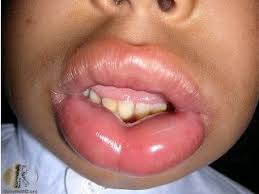
ALSO KNOWN AS
Angioneurotic edema
DESCRIPTION
* This is a syndrome of swelling in the deep layers of the skin. Lip swelling is usually prominent. It is often associated with Urticaria (hives).
* Angioedema is often caused by an allergic type reaction (i.e., the body's defense system mistakenly goes off, initiating reactions in the body). This occurs because histamine released from mast cells starts a cascade of events that result in allergy and angioedema.
ALSO KNOWN AS
Angioneurotic edema
DESCRIPTION
* This is a syndrome of swelling in the deep layers of the skin. Lip swelling is usually prominent. It is often associated with Urticaria (hives).
* Angioedema is often caused by an allergic type reaction (i.e., the body's defense system mistakenly goes off, initiating reactions in the body). This occurs because histamine released from mast cells starts a cascade of events that result in allergy and angioedema.
SYMPTOMS
* Lip swelling
* Eyelid swelling
* Tongue swelling
* Hives
* Nausea/vomiting
* Intermittent sharp abdominal pain
* History of sudden onset of shortness of breath
CAUSE
* Allergic sensitivities
1. Pollens
2. Foods (i.e., shellfish, eggs, nuts, chocolate, tomatoes, milk, and berries)
3. Medications
4. Molds
5. Bee stings
6. Venom
7. Dermographism (a form of Urticaria)
8. Cold
9. Light
10. Exercise
11. Inherited forms (genetic): hereditary angioedema or HEA
12. Complement mediated (an immune pathway)
13. Medications (nonallergic, but direct cause, such as ACE inhibitors)
14. Aspirin
15. Other anti-inflammatories
16. Dyes
17. Chemicals
18. Emotional stress
19. Unknown
HOW THE DIAGNOSIS IS MADE
* Examination:
1. Swelling of lips, eyelid or tongue -- usually resolves within 72 hours.
2. There is itching, but very little aching.
3. Hives may or may not be present.
4. Stridor (wheezing in neck area)
* Laboratory findings may include:
1. Abnormal complement levels (i.e., C4, C1 assay may help in diagnosing HAE)
2. Vasculitis workup may be done (ANA, RA, CBC, ESR) if no other etiology for angioedema is found.
3. Rarely, skin biopsy is needed.
TREATMENT
* Medications
* Antihistamines (e.g., Hydroxyzine for acute attacks)
* Doxepin (an older antidepressant) helps with chronic (continuous) form
* Calcium channel blockers
* Terbutaline
* Colchicine
* Danazol
* Plasmapheresis (exchange of plasma in blood) used for rare unresponsive chronic forms
IF YOU SUSPECT THIS CONDITION
* Angioedema can be life threatening. Seek emergency medical treatment.
PREVENTION
* Identify and eliminate causative agents. Special diets may be prescribed.
SIMILAR CONDITIONS
* Hives
* Allergic reactions
MISCELLANEOUS
* Note
- Angioedema often involves complicated immune chemical pathways. Often your primary care physician will need to refer you to allergy specialists in order to properly treat your condition.


No comments:
Post a Comment